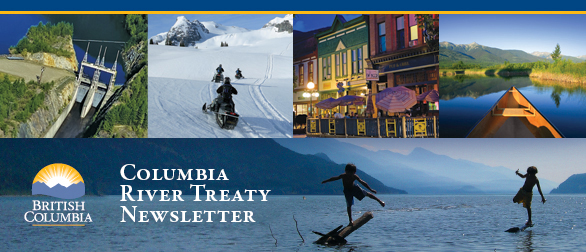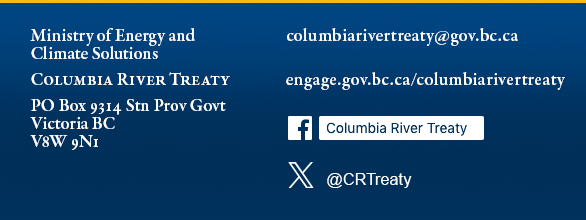Columbia River Treaty
Edition: September 2019

Columbia River Treaty Town Hall in Boise, Idaho
Sep 5, 2019
On July 18, 2019, the United States’ lead Columbia River Treaty negotiator, Jill Smail, led a town hall meeting in Boise, Idaho, to provide an update on Treaty negotiations.
It’s the fourth in a series of town halls presented by the U.S. Department of State to hear U.S. Basin residents’ perspectives about the Treaty and keep them informed as negotiations progress. This event followed similar sessions over the past couple of years in Spokane, Portland, and Kalispell.
Boise is the capital of the state of Idaho. It’s located on the Boise River in the southwest corner of the state and is home to about 230,000 people. The town hall took place in the Lincoln Auditorium at the Idaho State Capital Building and was also webcast.
The session began with a short video from Idaho senator James Risch, chair of the Senate Foreign Relations Committee, who expressed his appreciation to the participants for attending and committed “to ensuring the key Treaty themes of energy production and flood control are successfully negotiated to get Idahoans to a good deal.”
Jill Smail then took the floor and provided background on the consultation and negotiation process on the Treaty and where things are at now, saying that “at the Department of State we’re eager to move forward to help define how Americans and Canadians, including the Tribes in the United States and First Nations in Canada, will continue to mutually benefit from the Treaty.”
Smail reviewed the history and benefits of the Treaty, and outlined the objectives guiding the U.S. team as they work on modernizing the Treaty regime, including “continued, careful management of flood risk, ensuring a reliable and economical power supply, and improving ecosystem benefits,” adding that “we also need to determine with Canada how we might build in flexibility to adapt to changes based on new information, technology, or changes in snow and rainfall patterns. It will be challenging to define how we plan for future unknowns, but we want to work through these issues together.”
Before opening up the floor to questions and comments from the audience, Smail concluded her opening remarks, noting that “the United States and Canada have a long, positive history of engagement on the Columbia River, and our goal is to make sure that we continue this global model of co-operation for many years to come.”
Speakers urged the U.S. negotiators to consider how the Treaty affects hydropower, flood control, ecosystems including fisheries, salmon migration and endangered species, crop production and export, and navigation.
Smail wrapped up the town hall by expressing her appreciation for the diversity of perspectives presented at the session and thanking all the participants for opening up and sharing what was important to them and how they would like to see things done regarding the future of the Columbia River Treaty.


